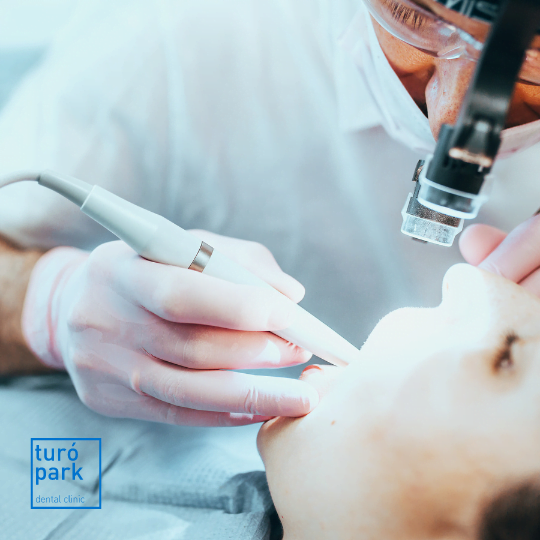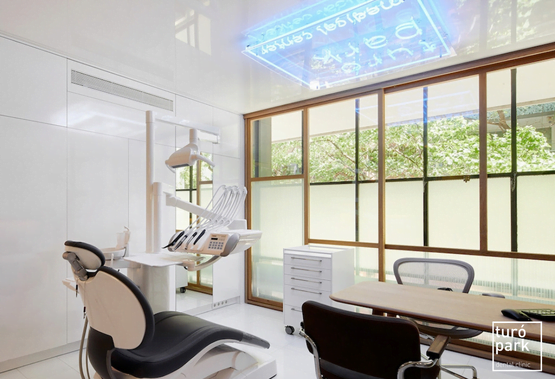Are you looking for a specialist in root canal treatment and endodontic surgery in Barcelona?
Endodontics is a branch of dentistry that treats the inside of the tooth (dental pulp and root canals). The most common treatment in Endodontics, or root canal treatment, which in most cases saves a very damaged tooth that would otherwise have to be extracted.
A consultation with an endodontist is necessary when the pulp of your tooth becomes infected or inflamed. The causes of infection or inflammation can be many: deep decay, tooth fracture, cracks, repeated treatments on the same tooth, etc.
If you wish to consult an endodontist, make an appointment now with one of our English-speaking specialists. Depending on your situation and your needs, they will propose a suitable treatment plan.
What is endodontics?
Endodontics is a specialty of dental surgery that treats pathologies related to the interior of the tooth with the aim of making it healthy and functional. The term endodontics comes from "endo" which means "inside" in Greek and "dontie" which refers to "tooth". Endodontics is the prevention, diagnosis and treatment of diseases of the pulp and periapical (desmodont and alveolar bone). It usually involves a root canal and aims to preserve the natural teeth in order to avoid implants and prostheses.
Fast track your treatment
To book an appointment or speak with one of our friendly team, please get in touch using the options below

What are the pathologies of the pulp?
The pulp is the inside of the tooth. It is made up of cells, vessels, nerves and various tissues. It is the pulp that ensures the "vitality" of the tooth. It can be affected by several pathologies, which sometimes cause the dentist to remove it. This is called root canal treatment.
It can occur as a result of decay, trauma, fracture or repeated dental treatments on the same tooth. It should be noted that trauma (impact) can lead to pulp damage even if the tooth has no visible signs of fracture. If the inflammation is not treated, it can cause pain, commonly known as "toothache", or lead to an abscess. In the event of a dental emergency, you should not delay in seeking help!
Root canal treatment or tooth devitalization
Carried out under local anaesthetic by the dental surgeon, the treatment makes it possible to remove all infected tissues. During the operation, which is performed through the crown of the tooth, the canals are cleaned, disinfected and finally sealed to avoid any re-infection. If you have a granuloma, it will disappear spontaneously and the bone will gradually rebuild itself in the same way that a fracture repairs itself. Healing takes between 6 and 48 months depending on the case.
Once the endodontic treatment has been carried out, it is very important to restore the damaged part of the tooth quickly in order to prevent the reappearance of bacteria in the canals and to consolidate the tooth to avoid fracture. Depending on its condition, the tooth will be restored with a composite or a prosthetic crown. To monitor and control the healing process, radiographic checks can be made.
Here is a video that shows how a root canal treatment is performed:
Endodontic microsurgery
Endodontic surgery is sometimes necessary if, after a period of observation varying from 6 months to one year, the radiographic images show no improvement or if, after endodontic treatment, pain persists for several weeks. There are several possible causes for this:
- Natural calcification of the canal
- Presence of a fractured instrument during the previous treatment
- Special anatomy of the tooth to be treated
In these situations, endodontic surgery may be considered by your dentist at Turó Park Clinics. This consists of making a small incision in the gum (rather than the tooth itself) under local anaesthetic, which allows it to be lifted to uncover the bone and eliminate the infected tissue. The gum is then put back in place with stitches.
Choose the best for your teeth.
Our English-speaking dentists specialised in endodontics have high-tech equipment at their disposal for quality treatment.

Our English-speaking endodontic dentists


They talk about us
Our answers to the most frequently asked questions about root canal treatment and endodontics
Does endodontics hurt?
How do I know if I should see an endodontist?
What are the contraindications to root canal treatment?
Dental societies and organisations










Have a look to the financing options
Don't worry, we take care of everything!